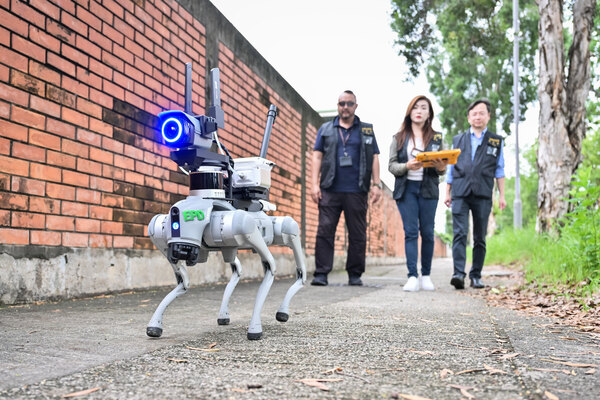AI DOG TRACES SOURCE OF POLLUTION
14-6-2024
Alphabetical Index
依字母搜索

With the goal of leveraging technology to enhance work efficiency, the Environmental Protection Department introduced the Artificial Intelligence (AI) Environmental Air Nuisance Investigation Robot Dog to assist the department’s investigators in handling air pollution incidents.
With its capabilities of identifying the properties of unknown gases and objectively providing pollution indicators and other data to aid in the probe of air pollution incidents, the AI robotic dog raises its paw when it sniffs an unknown gas to indicate the presence of gas. It then autonomously tracks the direction the gas is coming from, guiding investigators to the source of pollution.
Helping humans
Environmental Protection Department Senior Environmental Protection Officer Law Chi-wing explained that even though investigators mainly rely on their own sense of smell to identify sources of pollution, the AI robotic dog provides objective data and quickly tracks the location of such sources.
The department envisions a future where this gas-sniffing robot dog can replace human investigators when it comes to entering dangerous and enclosed spaces during pollution investigations, thereby enhancing the efficiency of their investigations and the occupational safety of the investigators.
Equipped with advanced computer vision and gaseous sensors, the AI robotic dog can autonomously search for the location of pollution sources using AI algorithms and infer the origins and activities causing such pollutants.
Mystery-solving robot
This AI robotic dog recently played a crucial role in solving the mystery behind an air pollution case in the Yuen Long Industrial Estate.
Environmental Protection Department Senior Environmental Protection Inspector Viane Lee pointed out that the robotic dog cracked the case on its first mission. She said she simply followed the direction indicated by the robotic dog and finally discovered the source of the pollution.
The department’s Chief Environmental Protection Inspector Leung Kwok-wing expressed the hope that in the future, the AI robotic dog can learn to distinguish more smells, such as odours from farms, cooking oil in alleys in addition to those coming from waterways and ones that may affect citizens. This would allow different teams to use the robotic dog for a variety of investigation tasks.
Embracing AI
While the department developed the AI robotic dog, it is deeply indebted to the Smart Government Innovation Lab for its help.
The lab organised the Innovative Application with AI Innovation Competition to encourage government personnel to utilise AI to enhance public services and work efficiency.
The department participated in the competition and came in second place, which paved the way for the implementation of the AI robotic dog concept to investigate air pollution.
Office of the Government Chief Information Officer Systems Manager (Smart Government Innovation Lab) Samuel Cheong stated that during the competition, the lab collaborated with the local innovation and technology industry, including startups, to provide technical support for the top 10 finalists and conduct a six-month proof-of-concept exercise.
After the conclusion of the competition, the lab began working with relevant departments to implement key pilot projects, such as the AI robotic dog idea, as soon as possible to enhance their operational efficiency.
The office aims to strengthen the connection between government departments and the industry through such competitions.
What is more, by enhancing government personnel's understanding and application of innovative technologies like AI, the office seeks to inspire innovative ideas and introduce different technologies to optimise public services, ultimately benefitting and providing convenience to citizens.
PREVIOUSNEXT
Latest Business News
最新商業資訊
Nov retail sales down 7.3% 2-1-2025

The value of total retail sales in November, provisionally estimated at $31.7 billion, decreased 7.3% compared with the s...
Mortgage loans up 27.7% 31-12-2024

The value of residential mortgage loans approved in November was $24.2 billion, a 27.7% increase compared with October, t...
Alerts to help with suspicious calls 30-12-2024

The Office of the Communications Authority (OFCA) today announced that, starting from tomorrow, local mobile service prov...
Startup ecosystem hits new heights 27-12-2024

Hong Kong's startup ecosystem has been steadily maturing in recent years, leading to a surge in early-stage firms with s...